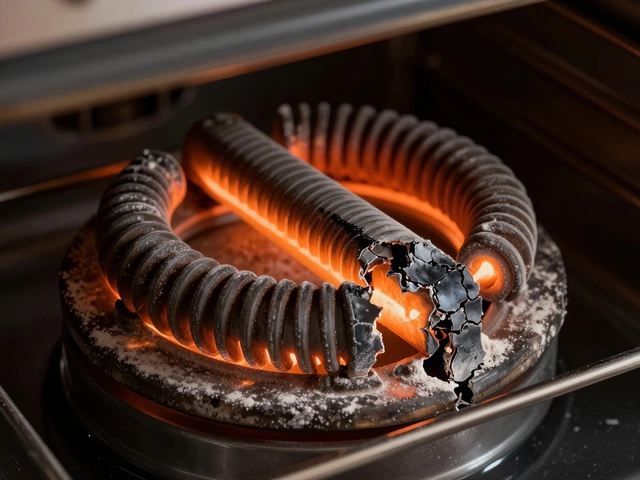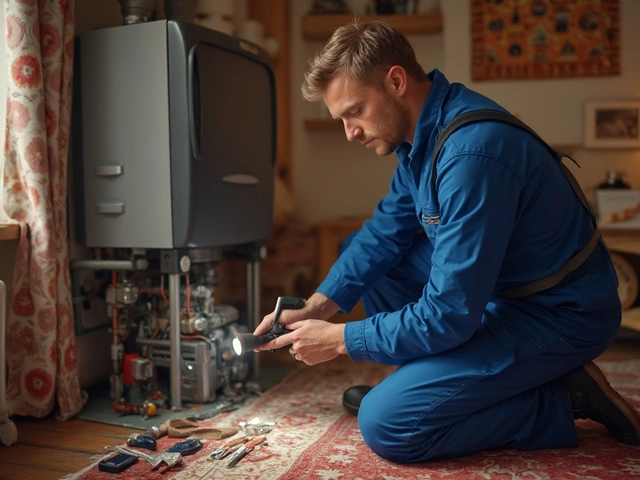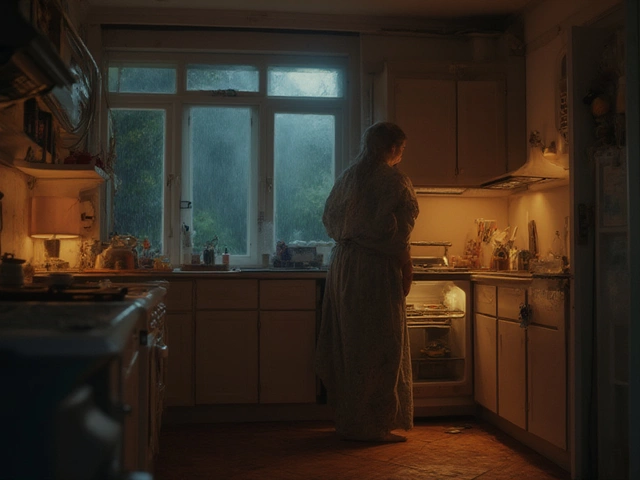If your boiler has stopped working, the first thing you feel is the chill. Before panic sets in, take a breath and run through a few easy steps. Most broken‑boiler problems have a simple cause you can spot yourself, and fixing them early saves money and discomfort.
Boilers fail for a handful of reasons that show up as the same symptoms: no heat, no hot water, or strange noises. The most frequent culprits are:
Knowing which of these fits your situation narrows down what to check next.
Grab a flashlight and follow these quick steps. You don’t need any special tools—just common sense.
1. Check the pressure gauge. Find the small dial on your boiler. If it reads below 1 bar, locate the filling loop (usually a metal hose with a valve). Open the valve slowly until the gauge reaches 1.2 – 1.5 bar, then close it. If the pressure falls back quickly, you probably have a leak and need a pro.
2. Reset the boiler. Many modern units have a reset button. Press it, wait a minute, and see if the boiler fires up. If it trips again, note the error code on the display—that code is useful for the engineer.
3. Look for frozen condensate pipe. The pipe is a thin white hose near the boiler. If it’s icy, gently warm it with a hair dryer (keep the dryer moving) or wrap it in a warm towel. Never use an open flame.
4. Bleed radiators. Air trapped in radiators lowers system pressure. Use a radiator key to open the bleed valve until water flows, then close it. This can restore pressure and heat.
5. Listen for strange noises. A loud bang often means air in the system or a failing pump. If you hear it repeatedly, turn the boiler off and wait for it to cool before calling a technician.
If any of these steps solve the issue, great—you’ve saved a call out. If not, it’s time to call a qualified boiler engineer. Trying to fix a gas valve, heat exchanger, or electrical component without training is risky and can void warranties.
When you call, have these details ready: boiler make and model, error code (if shown), recent pressure readings, and what you’ve already tried. This info speeds up diagnosis and can lower the call‑out cost.
Remember, regular annual servicing keeps most of these problems at bay. A yearly check catches worn parts, cleans the heat exchanger, and ensures the pressure valve works properly. It’s a small investment that prevents a broken boiler in the first place.
In short, a broken boiler isn’t always a nightmare. A quick pressure check, a reset, and a look for frozen pipes often get things back on track. When those basic fixes don’t work, call a Gas Safe‑registered professional—your home’s heat and safety depend on it.

Wondering how long you can cope with a broken boiler? Get clear facts, repair timelines, survival tips, and legal details so you don’t get left in the cold.

Stuck with a broken boiler and a cold house? This guide shares quick, practical steps to keep your home warm without a working boiler. Learn about safe heating alternatives, ways to trap heat, and smart tricks for getting through chilly nights. Find out what to avoid, when to call a professional, and how to prep for future breakdowns. Perfect for homeowners who want to stay safe and comfortable during a boiler emergency.

A malfunctioning boiler can be a real nuisance, especially during the cold months. Understanding whether a broken boiler constitutes an emergency is crucial. This article provides insights into when to prioritize boiler repairs, potential risks associated with delayed attention, and essential DIY tips to consider before professional help arrives. Dive into valuable advice on maintaining your heating system efficiently.

Learn how to tell if your oven element is blown by checking for visible damage, testing with a multimeter, and observing oven behavior. Most oven heating issues are simple fixes.

Wondering if your oven can hit the 20-year mark? This article digs into what really decides how long an electric oven lasts, from the make to how you treat it. Get real tips to keep yours running strong, spot early signs of trouble, and find out when repair is smarter than replacement. No fluff—just straight answers for anyone looking to save money and avoid surprise oven breakdowns. This is your guide to squeezing every last year out of your electric oven.

Regular boiler servicing is crucial to ensure safety and efficiency in home heating systems. A comprehensive service involves thorough inspections and cleaning, enhancing performance and extending the lifespan of the unit. Areas covered include checking the burner, inspecting the flue, and ensuring controls work correctly. Routine servicing helps prevent breakdowns and identifies potential issues early. Understanding what's involved can help homeowners make informed decisions and maintain reliable heating.

Dryers are workhorses in the laundry room, but they aren't immune to problems. This article breaks down the most common issues found in tumble dryers, from weird noises to clothes that just won't get dry. You'll find straightforward explanations for why these problems happen and learn some practical tips to fix or prevent them. Plus, get the inside scoop on when you should call for a pro. Save money, avoid headaches, and keep your dryer running smoother for longer.

Leaving an electric oven on overnight sounds harmless, but it could spell real trouble. Learn the risks, facts, and safer options for your late-night cooking needs.